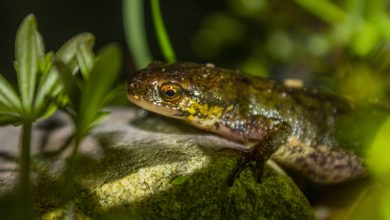University of Manchester helps secure £34 million for transformative UK life sciences data project

Academics at The University of Manchester have been at the forefront of securing a transformative project set to revolutionise UK life sciences research.
Today, UK Research and Innovation (UKRI), has announced £34 million investment in a ground-breaking project, BioFAIR, which aims to overhaul research data management across the nation.
The project, initially proposed by the ELIXIR-UK community, which is co-led by Professor Carole Goble from the University of Manchester, aims to establish a cohesive, UK-wide digital research infrastructure that bridges current gaps between researchers, digital research technical professionals, existing institutional digital research infrastructures, and the funder-community partnership.
It will deliver a step change in the UK’s capability to translate existing and future life science data assets into world leading research in response to some of society’s most pressing challenges.
ELIXIR-UK is the UK Node of ELIXIR, a European project to integrate life sciences data across the continent with the aim of facilitating the linking of data worldwide. Professor Goble has been co-leading on the business case and investment activity for the project in partnership with the Earlham Institute and UKRI over the last six years and has played an instrumental role in securing the award for the UK. She is also leading the architecture requirements development of the BioFAIR Commons.
BioFAIR will be a catalyst for innovation and discovery and over its five-year life span will:
- accelerate the adoption of findable, accessible, interoperable and reusable (FAIR) data principles across the UK life sciences, making it more useful and valuable to researchers than ever before
- unify the UK’s currently fragmented digital research landscape, fostering unprecedented opportunities for collaboration and coordination among the national life sciences community
- break down barriers to democratise data accessibility, giving UK researchers the resources and autonomy needed for innovation and discovery to flourish
- coordinate and deliver extensive training and support for practitioners at all levels, building critical workforce capacity and securing the UK’s position as a global leader in life sciences
Fundamental to the BioFAIR concept are its four key capabilities. Each will be assembled from existing data tools and services developed and deployed by the UK and international life science research communities.
Collectively, the four capabilities signify an important ethos of one community driving and sharing responsibility for the management and use of national assets to maximise accessibility, usability and impact.
The data commons will catalogue sources of existing datasets, making them easily accessible to life science researchers. It will support FAIR data management throughout the data lifecycle, from the point of collection to deposition and, crucially, to reuse.
The method commons will enable the collaborative use of shared computational workflows with a national workflow capability. It will feature a national repository of trusted and curated data methods and workflows, contributed by the life sciences research community, supporting reproducible data analytics and advancing data-driven bioscience.
The community centre will provide a focal point for sharing expertise, best practice and troubleshooting within disciplines.
The knowledge centre will enable those driving the collection and curation of existing knowledge resources and training materials to advance best practice in research data management.
Together, the community and knowledge centres will create a collaborative environment that supports more effective dissemination of research data management knowledge and skills across the life sciences research community.
Mission critical
Put simply, BioFAIR is mission critical to the future of UK life sciences research. At its core the project will deliver major efficiency gains by streamlining research data management.
By better connecting research teams and championing the reuse of data and methods, BioFAIR will help accelerate research, leading to faster scientific breakthroughs as a result.
But BioFAIR adds significantly more value than efficiency alone. It will:
- pioneer innovation, with its state-of-the-art tools and methods paving the way for future scientific success
- future-proof the UK life sciences ecosystem by integrating advanced computational tools and methods to set the stage for new innovations that can be translated and commercialised for maximum impact
- support economic growth and prosperity by upskilling the life sciences research data management workforce and enabling new opportunities for the UK’s scientific leadership
Community driven from the outset, the concept of BioFAIR originated as an idea submitted to BBSRC’s Bioscience Big Ideas Pipeline by the ELIXIR-UK team.
This collaborative ethos remains at the heart of BioFAIR, complemented by additional UK and international initiatives to ensure best practices are shared and interoperability across disciplines is promoted.
BioFAIR’s success heavily relies upon the combined ability and proven track record of the UK life science research community in developing and operating research data management tools and services.
As the awarded hosts of BioFAIR’s coordinating hub, the Earlham Institute’s strengths will be complemented by a skilled and distributed network of UK partners responsible for project leadership and delivery.
Dr Sarah Perkins, Executive Director for Strategic Planning, Evidence and Engagement at BBSRC and the UKRI Senior Responsible Officer for BioFAIR, said: “Digital research infrastructure has fast become as critical to UK bioscience as physical infrastructure.
“The BioFAIR project will provide the backbone for ground-breaking research, enabling researchers to tackle key societal challenges head-on. By democratising access to crucial data and methods, BioFAIR ensures that the UK life science community can innovate faster and more effectively than ever before.”
Gerry Reilly, Interim Director of BioFAIR, said: “Our vision is to create a powerful federated digital research infrastructure that revolutionises UK life science research. By leveraging established best practices and capabilities, we will build a national platform that ensures the effective adoption of FAIR principles and drives efficiency across all UK life science research institutions.
“Developed by the research community for the research community, BioFAIR will transform the future face of the UK life sciences.”
Visit the BioFAIR website for regular project updates or email your questions to [email protected].




